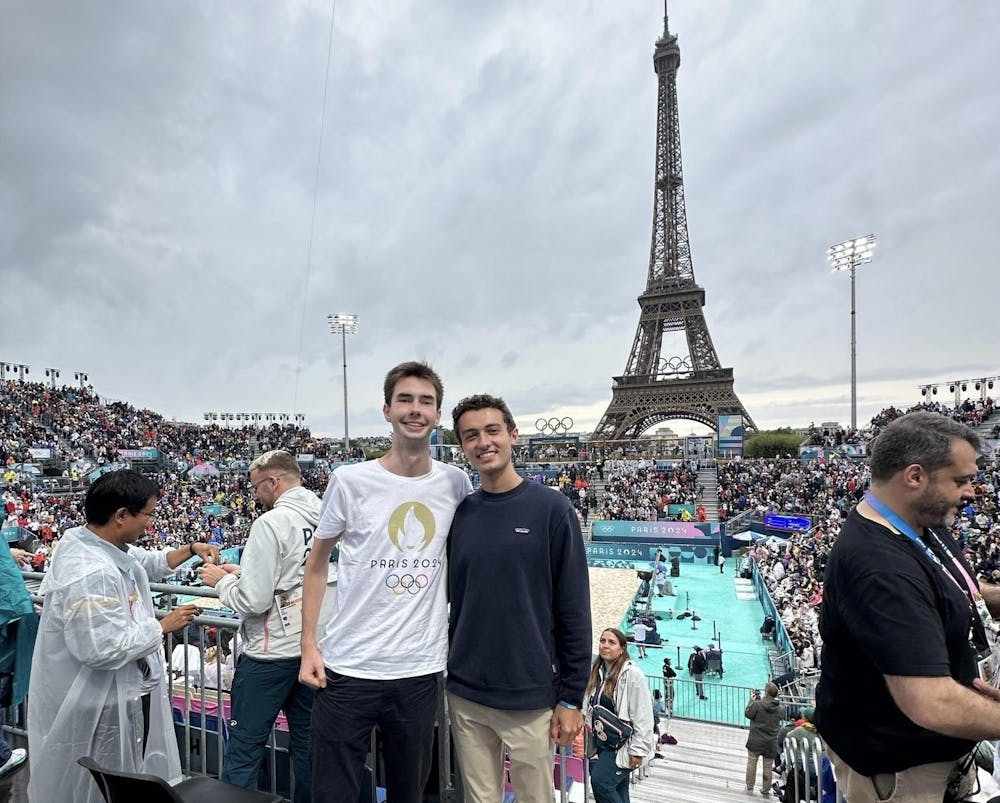Paris is famously known as the City of Light. Its iconic riverbanks, world-class restaurants and shops, and, of course, the Eiffel Tower have made it a picturesque destination for centuries. However, this year, the city is embracing a new title: host to the 2024 Olympic Games. As a Princeton student located in Paris for the summer, I witnessed this grand city transform into the world’s biggest stage — upending day-to-day life as the world turned to watch Olympic history be made.
This is not the first time that the city has held the Olympic Games. In fact, the 2024 Games mark the third time the French capital has put on the Olympics, following the 1900 and 1924 Games. However, Paris has grown — doubling in population — since a century ago when it last hosted. The city's status today as a global hub for business and popular summer tourism destination has made preparation for this year’s game challenging like no other.
I arrived in Paris at the end of May to begin my internship, organized by Princeton’s International Internship Program (IIP). The company I interned for moved the timeline of my experience forward one week to avoid any conflict with the Olympic Games at all. That was the first indication that the Games would become a once-in-a-lifetime spectacle, and I made sure to stay after my internship ended to see Paris at this special moment.
Alongside other Princeton classmates also spending the summer in Paris through the IIP, I tracked signs of progress. Small stadiums were slowly constructed in the city center and spectator seating went up along the Seine. However, nothing prepared me for the big shift that came two weeks before opening ceremonies. Several of the city’s central bridges connecting the left and right banks closed, making travel above ground from each side extremely difficult. I began to notice heavily armed members of the French National Guard surveying the grounds of the metro stops at all times. On top of it all, new arenas and stadiums appeared like magic in the city’s center. Paris was a city transformed and reinforced.
As the summer progressed, there were various Olympic-related sights and surprises. When Bastille Day arrived, the typical holiday fireworks in front of the Eiffel Tower featured elaborate drone visuals of various sports. Later in July, Paris Mayor Anne Hidalgo jumped into the Seine in order to prove that it was clean enough to serve as the water basin for the Olympic triathlon events.
My friend, Justin Anderson ’26, who was also in Paris through IIP, saw this in person.
“It was quite the spectacle, with almost a hundred swimmers led in the water by Mayor Hidalgo, and many of them stayed in the water for longer than necessary floating around playing catch,” he said.
As the start of the Games approached, the city began to feel more crowded, but it wasn't as noticeable as you might expect; there were still quiet spots to be found in the Place des Vosges and Le Marais. It was reassuring to know that parts of Paris seemed to remain untouched by the global phenomenon that was about to arrive in town.

Soon, opening day arrived, and the officials involved in the planning of this iteration of the games delivered on its promise of staging an unprecedented river-cruise-style opening ceremony. The presentation was grandiose and well-executed despite the rainy weather, culminating in a powerhouse closing performance by Celine Dion on the Eiffel Tower. The Olympic Games were officially in full swing.
Next came the events for which I had bought tickets: beach volleyball and men’s gymnastics team finals. Beach volleyball was first, and it took place at the open-air Eiffel Tower Stadium, right outside of the iconic landmark. Though it was drizzling, spirits were still high on the first day of the Games. I spoke to a couple in line who had traveled from Orlando just for the Olympics and could not contain their excitement. After a short queue, spectators were treated to hard-fought matches between women’s teams for China and Australia and men’s teams for Brazil and Morocco, respectively. Australia and Brazil pulled out the wins for their home countries.
Men’s gymnastics were even more exhilarating. The men’s team finals took place at the Accor Arena in the Bercy area — the same venue where Simone Biles would compete in her first event the following day. We were treated to a range of events, including rings, pommel horse, and parallel bars. To our surprise and excitement, Team USA ended up taking home the bronze behind Japan and China after Stephen Nedoroscik delivered a showstopping performance on the pommel horse. It was the first time in 16 years that the USA men’s gymnastics team had medaled, and we celebrated alongside the gymnasts’ families, who sat immediately to our right.
Of course, Princeton representation appeared sooner or later in the Games. Just days after the Opening Ceremony, Maia Weintraub ’26 won a gold medal in the women’s team foil fencing event. In total, 25 other Princeton students past and present competed in other Olympics events in the following days.

Ultimately, the 2024 Olympic Games transformed a summer that could have easily been a routine internship in Paris into a truly special experience. The city did not always seem prepared for the large intake that the Olympics would bring, but ultimately it delivered on its sky-high expectations. Hopefully, it will take less than another century for the Olympic Games to return to the City of Light.
Edward Rogers is a staff writer for The Prospect from Durham, North Carolina. He can be reached at edward.rogers@princeton.edu.








